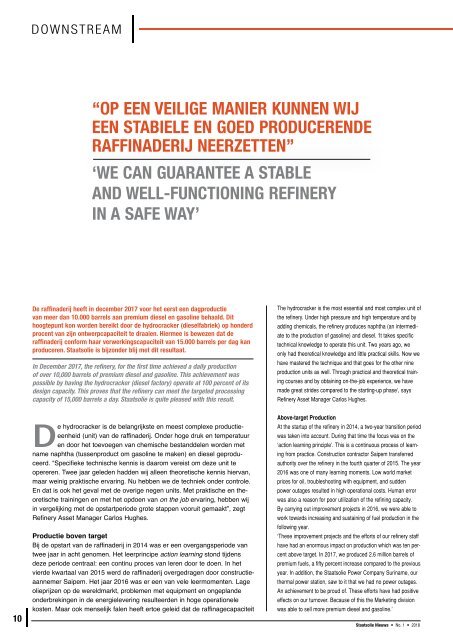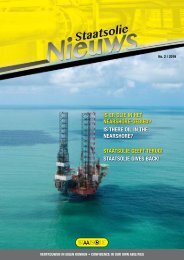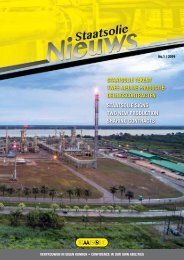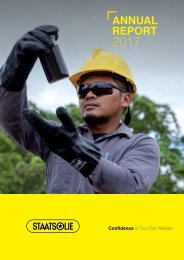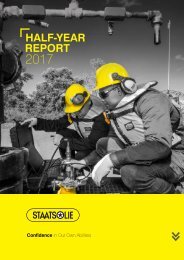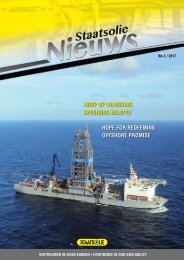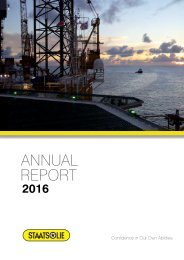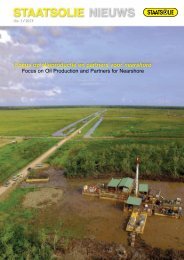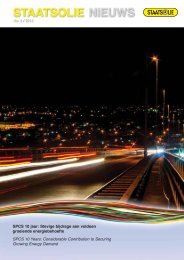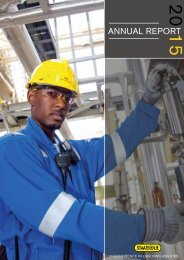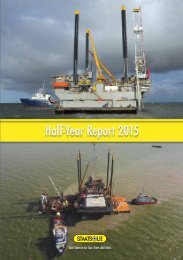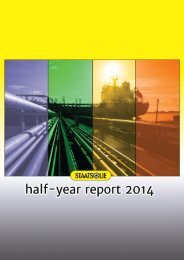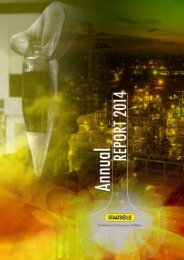Staatsolie Nieuws Mei 2018
You also want an ePaper? Increase the reach of your titles
YUMPU automatically turns print PDFs into web optimized ePapers that Google loves.
DOWNSTREAM<br />
“OP EEN VEILIGE MANIER KUNNEN WIJ<br />
EEN STABIELE EN GOED PRODUCERENDE<br />
RAFFINADERIJ NEERZETTEN”<br />
‘WE CAN GUARANTEE A STABLE<br />
AND WELL-FUNCTIONING REFINERY<br />
IN A SAFE WAY’<br />
De raffinaderij heeft in december 2017 voor het eerst een dagproductie<br />
van meer dan 10.000 barrels aan premium diesel en gasoline behaald. Dit<br />
hoogtepunt kon worden bereikt door de hydrocracker (dieselfabriek) op honderd<br />
procent van zijn ontwerpcapaciteit te draaien. Hiermee is bewezen dat de<br />
raffinaderij conform haar verwerkingscapaciteit van 15.000 barrels per dag kan<br />
produceren. <strong>Staatsolie</strong> is bijzonder blij met dit resultaat.<br />
In December 2017, the refinery, for the first time achieved a daily production<br />
of over 10,000 barrels of premium diesel and gasoline. This achievement was<br />
possible by having the hydrocracker (diesel factory) operate at 100 percent of its<br />
design capacity. This proves that the refinery can meet the targeted processing<br />
capacity of 15,000 barrels a day. <strong>Staatsolie</strong> is quite pleased with this result.<br />
The hydrocracker is the most essential and most complex unit of<br />
the refinery. Under high pressure and high temperature and by<br />
adding chemicals, the refinery produces naphtha (an intermediate<br />
to the production of gasoline) and diesel. ‘It takes specific<br />
technical knowledge to operate this unit. Two years ago, we<br />
only had theoretical knowledge and little practical skills. Now we<br />
have mastered the technique and that goes for the other nine<br />
production units as well. Through practical and theoretical training<br />
courses and by obtaining on-the-job experience, we have<br />
made great strides compared to the starting-up phase’, says<br />
Refinery Asset Manager Carlos Hughes.<br />
10<br />
De hydrocracker is de belangrijkste en meest complexe productieeenheid<br />
(unit) van de raffinaderij. Onder hoge druk en temperatuur<br />
en door het toevoegen van chemische bestanddelen worden met<br />
name naphtha (tussenproduct om gasoline te maken) en diesel geproduceerd.<br />
“Specifieke technische kennis is daarom vereist om deze unit te<br />
opereren. Twee jaar geleden hadden wij alleen theoretische kennis hiervan,<br />
maar weinig praktische ervaring. Nu hebben we de techniek onder controle.<br />
En dat is ook het geval met de overige negen units. Met praktische en theoretische<br />
trainingen en met het opdoen van on the job ervaring, hebben wij<br />
in vergelijking met de opstartperiode grote stappen vooruit gemaakt”, zegt<br />
Refinery Asset Manager Carlos Hughes.<br />
Productie boven target<br />
Bij de opstart van de raffinaderij in 2014 was er een overgangsperiode van<br />
twee jaar in acht genomen. Het leerprincipe action learning stond tijdens<br />
deze periode centraal: een continu proces van leren door te doen. In het<br />
vierde kwartaal van 2015 werd de raffinaderij overgedragen door constructieaannemer<br />
Saipem. Het jaar 2016 was er een van vele leermomenten. Lage<br />
olieprijzen op de wereldmarkt, problemen met equipment en ongeplande<br />
onderbrekingen in de energielevering resulteerden in hoge operationele<br />
kosten. Maar ook menselijk falen heeft ertoe geleid dat de raffinagecapaciteit<br />
Above-target Production<br />
At the startup of the refinery in 2014, a two-year transition period<br />
was taken into account. During that time the focus was on the<br />
‘action learning principle’. This is a continuous process of learning<br />
from practice. Construction contractor Saipem transferred<br />
authority over the refinery in the fourth quarter of 2015. The year<br />
2016 was one of many learning moments. Low world market<br />
prices for oil, troubleshooting with equipment, and sudden<br />
power outages resulted in high operational costs. Human error<br />
was also a reason for poor utilization of the refining capacity.<br />
By carrying out improvement projects in 2016, we were able to<br />
work towards increasing and sustaining of fuel production in the<br />
following year.<br />
‘These improvement projects and the efforts of our refinery staff<br />
have had an enormous impact on production which was ten percent<br />
above target. In 2017, we produced 2.6 million barrels of<br />
premium fuels, a fifty percent increase compared to the previous<br />
year. In addition, the <strong>Staatsolie</strong> Power Company Suriname, our<br />
thermal power station, saw to it that we had no power outages.<br />
An achievement to be proud of. These efforts have had positive<br />
effects on our turnover. Because of this the Marketing division<br />
was able to sell more premium diesel and gasoline.’<br />
<strong>Staatsolie</strong> <strong>Nieuws</strong> • No. 1 • <strong>2018</strong>


